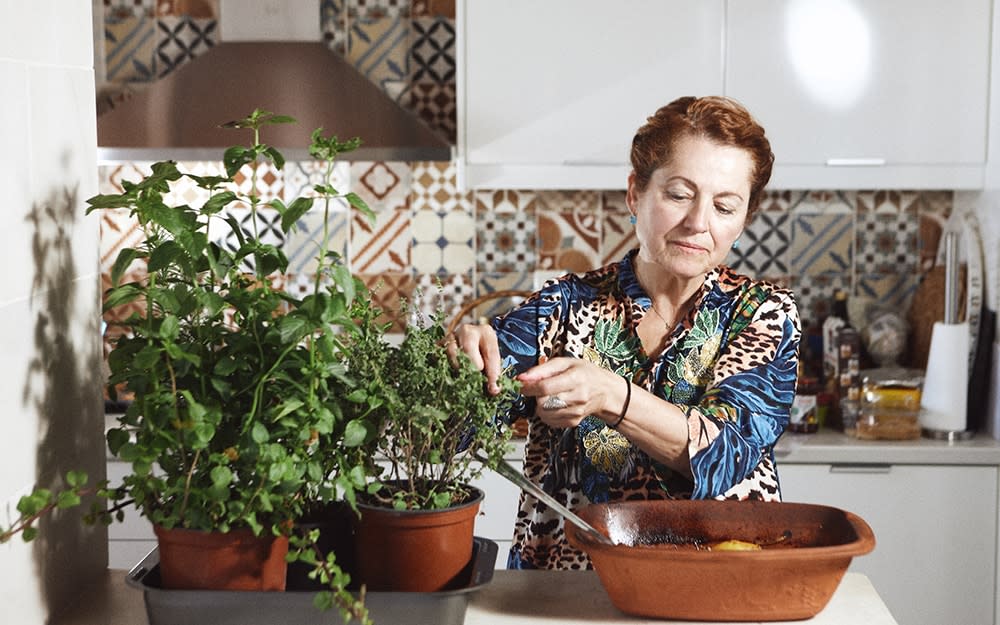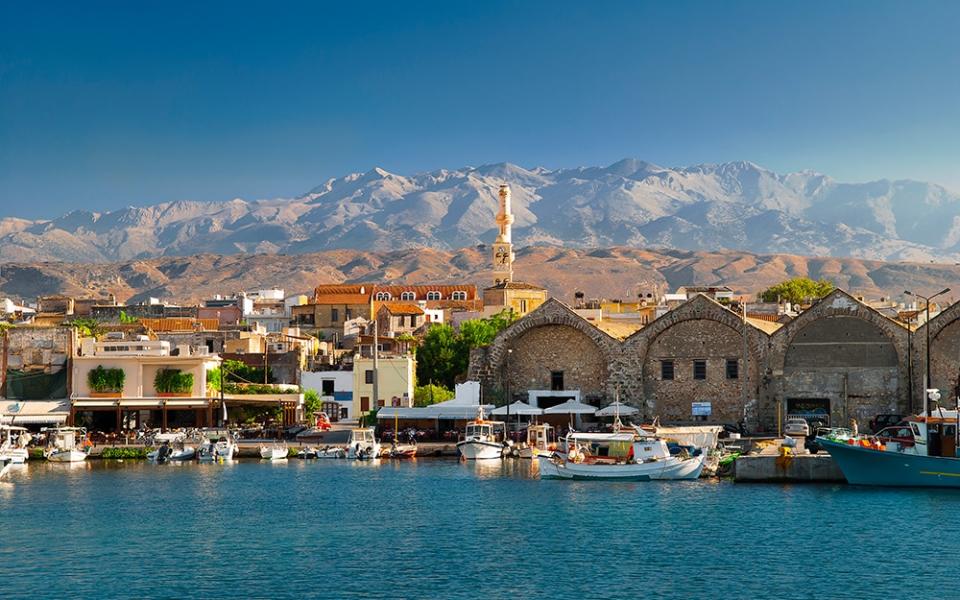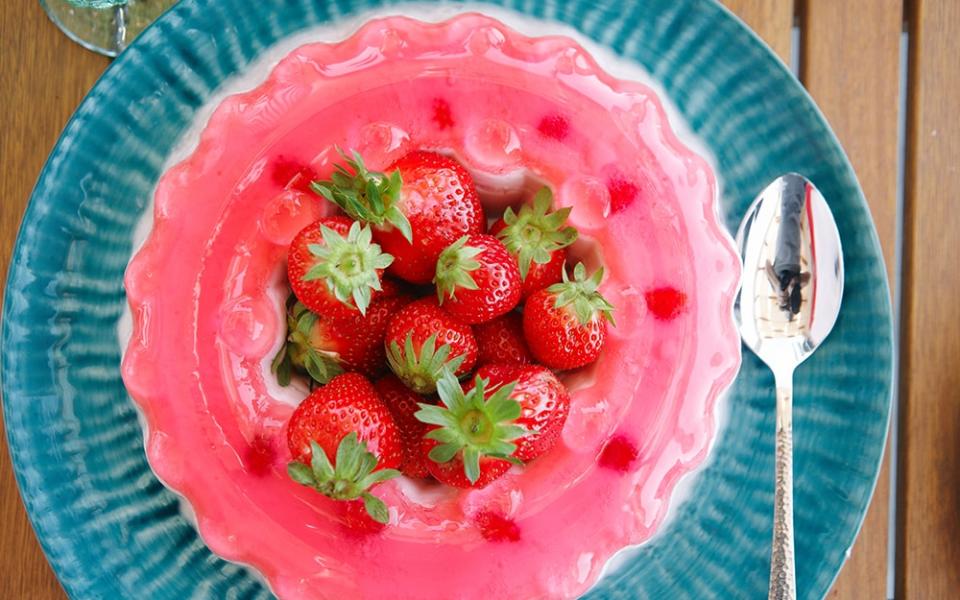Crete's culinary and travel secrets revealed by a MasterChef champion

MasterChef winner Irini Tzortzoglou returns to the island of her birth as a tourist – with just a little bit of cooking thrown in
Around half a million visitors travel to Crete from the UK every year. They come for the climate, the beaches, the history and the food. I’m one of the half million, as I live in the Lake District – but I don’t come to Crete for a holiday.
When I visit it has always been to spend time with my family. My mother was one of seven and my father one of three so the number of relatives I have spread around the island is pretty large – and they all seem to want a piece of me when I return. We have a house there, which means there are always things to be done to keep it to the high standard that I like.
However, my last visit was different. I spent a week in a wonderful villa in the west of the island – a safe distance from the relatives. With my husband, John, and his daughter Rachel’s family (husband Daniel, their daughter Ava, aged seven, and son Noah aged four) I got to do what all those other tourists do – soak up the sun, lie by the pool and recharge my batteries. I also had the opportunity to revisit some of the places which I remember from when I was growing up.
Naturally, there has been a huge amount of change since the 1960s, but the natural beauty of the island is still as I remember it. The Samaria Gorge will never be any less dramatic than it appeared to me when I first did the 10-mile trek from high up on the Omalos plateau to the coastal village of Agia Roumeli (from where the only way to leave is by ferry boat unless you go back the way you came!) And the pink-sand beach of Elafonisi is no less stunning now than it was when I first saw it.
Family holidays when I was growing up in Crete were few and far between. My parents were not wealthy and, living off the land as they did, were rarely able to take a break from the daily grind of tending to animals and irrigating or gathering crops. We didn’t have a car so when we did get away we would catch a rickety old bus from our village down to a small, sleepy village on the south coast for a few days.
I think my love of cooking came across in MasterChef and it seems to have rubbed off on the grandchildren. Ava is so keen to learn and so proud of the results of her labours. Noah wants to try to do everything (always at breakneck speed!). It’s great fun spending time with them in the kitchen and seeing their enthusiasm as together we prepare a meal. But loving cooking doesn’t mean that I want to be on duty for three meals a day. After all, a holiday is a chance to sample some of the great food on offer locally.

The area around Chania is rightly renowned for the fruit and vegetables which are grown locally – and the intensity of the flavours is remarkable. The west of the island is also known for its dairy produce, so this is where I enjoy the wonderful bougatsa pastry and mizithra cheese dessert, and the shallow-fried pitta from Sfakia which is served drenched with local honey.
I’ve lived in the UK for over 40 years but I’ve never been able to find produce to rival that of Crete, so even in a simple taverna here a basic xoriatiki (village) salad is bursting with zest and vibrancy. It’s all down to the climate, of course, which is so conducive to agriculture that two or even three crops a year are possible. Until the 1970s, agriculture had always been the economic mainstay of the island.
I’m always keen to enjoy the cooking being produced in Crete. The traditional image which many people in the UK may once have had of Greek food being not much more than moussaka and salad is no more accurate than the view that English food is all about fish and chips. I tried to show on MasterChef that elements such as trachanas (cracked wheat cooked in soured milk then dried in the sun) can be used in fine dining, and there are many Greek chefs finding creative uses for basic local ingredients.
The provincial capital of Chania is now unrecognisable in many ways from the small town I visited as a teenager – it is many times bigger and every second building seems to be either a hotel or a restaurant. I always love visiting, though. Much of the architecture dates to Venetian times and at the harbour entrance the lighthouse is a blend of Venetian, Egyptian and Ottoman influences. The streets of the old town are narrow, winding and packed with merchants selling their wares to tourists – my favourite shops are those of artisans and craftspeople. Most of all, I am interested in the food market which was modelled on the covered market of Marseille and which sells vegetables, fish, meat, herbs and spices, and local cheeses, olives and raki.
Back at the villa, it was time for me and my two young assistants to don our chef’s whites and get to work preparing a slightly belated meal for their grandfather’s birthday. Chicken is always a favourite so I brought with us a favourite utensil of mine called a gastra, a covered casserole dish made of clay. Our meal was cooked with white wine; sliced, preserved lemons from the tree in our courtyard: honey: mustard: chicken stock and dried oregano. The juices were mopped up with some lovely crusty bread. Separately, potatoes were roasted in chicken stock, a dash of olive oil just seasoned with salt and pepper and flavoured with wild fennel flowers. A Cretan salad accompanied by mizithra in the Chaniot fashion (as opposed to the feta cheese used elsewhere on the island) and a beetroot and green apple salad with a yogurt and za’atar dressing provided freshness, and the meal was rounded-off with a yogurt and strawberry chilled dessert served with fresh strawberries. A bottle of the chilled Mavro Provato (“Black Sheep”) wine from the Lazarides estate sealed the occasion.

I found it easy to see why British visitors fall in love with my home island. It has a natural beauty. The climate is reliably good (we were fortunate to have a pool to cool off in). The beaches are stunning – and the food has been spectacular. I must do this again!
The essentials
Irini and her family travelled to Villa Vereniki in Crete with independent villa specialists Simpson Travel (020 8003 6557; simpsontravel.com). A week in October is available from £644pp, based on six sharing, including flights, car hire and seven nights’ accommo-dation. A week in August is available from £1,360pp, based on six sharing, also including flights, car hire and seven nights’ accommo-dation.
Irini Tzortzoglou won the BBC’s MasterChef competition in 2019. Her new book, Under the Olive Tree: Recipes from My Greek Kitchen (£25, Headline) is out now. To purchase a copy from the Telegraph visit books.telegraph.co.uk or call 0844 871 1514.


